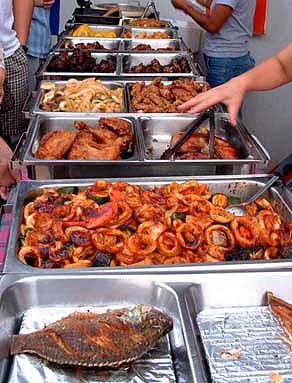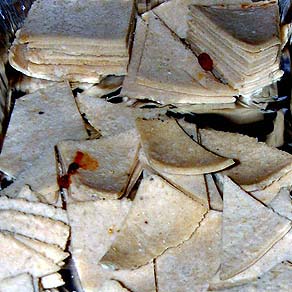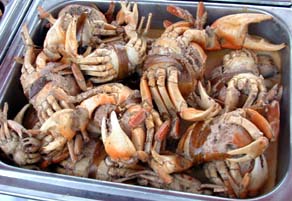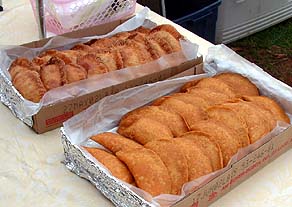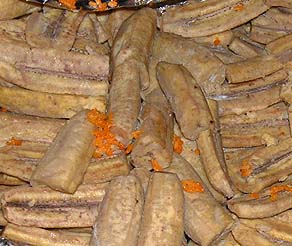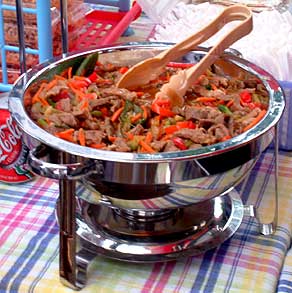 |
 |
 |
 |
||||
|
|
|
|
|
|
|
|
|
|
|
|||||||
|
|
|
|
|
|
|
"In Inarajan, I still see the culture pretty much intact," Bill remarks. "The family cohesiveness is still there. One thing that I really appreciate is the chenchule’ system, which creates a kind of financial institution. This is seen for instance when a death occurs. People beyond just the immediate family members will come together and assist in the burial, the financial support and the physical need also to be there. They provide support during the grieving period, when rosaries being held for nine days and where everybody is welcome to be there. "All those people are there to be with you, to not only help in grieving but also to assist with the financial part. Where the rosaries are held, food will be taken over, and money comes in also to help with the burial and other necessities. So I believe that is a very beautiful part of the culture and what it stems from really is a system called chenchule’ system."
|
||
|
|
||
|
“A lot of elements of the ancient culture are still surviving within the Catholic funeral ceremony,” Anne explains. “Funerals are the richest cultural events in part because they are really long. The funeral itself is in the church. But when a person dies, rosaries are held, nightly prayers for nine days. In those nine days between the death and the burial, there’s a lot of cultural activity. Then after the ninth day then you bury the person. "Just from the moment a person dies, word starts going out to friends and relatives, even before it gets in the newspaper. Then people start to come for the rosaries, and they start bringing food or whatever you need. Nowadays it’s if you need chairs, or a tent. In a very quick period of time, people start gathering around that family, which is how the ancient accounts describe funerals. After a person dies, for a long period of time, people will start gathering from different villages to come and pay respects to the family. The ancient accounts say the body would stay out until it started to smell. Now it’s nine days."
|
|
|
|
"When my grandfather died, I really witnessed the workings of the chenchule’ reciprocity system. Every night for nine nights, people came around who my grandfather knew. Of course there were a lot of relatives, but then came my mother’s co-workers, my father’s classmates, my cousin’s friends, my friends—it was really a family event that reminded you of all your ties, all your connections. "Now that I’m an adult, if I find out, ‘Oh my classmate’s father died,’ ‘Oh my former co-worker’s child died,’ I know that in those nine days I need to come at least once."
|
|
"You don’t have to go to the funeral itself, but if you go to one of those nine nights, then it’s reconnecting. And if you don’t go—you know, no one really keeps track of who doesn’t come—but if you don’t go, in a sense you’re not renewing your connection. "Today this is my parent’s social life on Friday: you look at the newspaper and see what are you doing this weekend because Saturday is the big funeral day. You look to see where you need to go, and you have to make sure whether you have any connection to someone who passed away—it doesn’t have to be a relative."
|
Pånglao tano', or land crabs. |
|
|
|
|
|
|
"The way that the chenchule’ reciprocity system works, it’s not like a direct exchange or direct trade. It’s a long relationship. When there’s a death in the family people will come, and these might be people who 20 years ago, the family helped them somehow. When my grandfather died, people were saying ‘oh yeah, back in 1960 he did this for me.’ That was 30 years before he died, and other people had very close, immediate reasons for being there. You know it was considered like a kind of payback, that 30 years ago he helped me—our roof blew off and he let us stay with them for a week and now we’re coming to the funeral. And we’re bringing food. We’re bringing whatever, doughnuts. That’s a kind of payback in this reciprocity system."
|
||
|
|
||
|
"But since those people came, now when something happens in their family, our family will return something, and that could be five years from now, or they could have a wedding tomorrow so it’s really kind of a fluid system. But by participating in it, you’re renewing the connection, that reciprocal connection that never really ends, and in a lot of ways it reaches a point where you don’t really remember what began it all."
|
|
|
|
"When I was a little girl, I tried to make them tell me, why are they all coming here? They’re not related to us, why are they coming here? In some cases, it was very easy: oh, that was my co-worker, or that man used to work for my grandfather. But some people, my grandparents couldn’t remember anymore, and it gets to the next generation where now my mom is going to do things for their family because of something my grandfather did and it mightn’t even have been him. It might have been his grandfather. We don’t really know but you just keep renewing the connection. "So that system, especially in funerals and typhoons, it’s the most helpful because people come to your aid and you don’t necessarily need to know who or why. There’s this kind of cultural faith: you know that network is there."
|
|
"When we were preparing for the rosaries every night, my mom kept telling me ‘don’t worry about the food. The food will just come.’ Finally I realized, ‘no kidding!’ Every night, where did all this food come from? And usually it’s the eldest women who are keeping track of it: ‘Did you see who put that plate on the table?’ Because it’s all very subtle. No one says, ‘I brought this, look!’ They usually send a little kid: ‘Go put it on the table.’ "But the older women are keeping track of it all. My mom and her sister are murmuring, ‘Did you notice, that was Tita’s grandson? They brought donuts.’ That system, it took me a long time to really understand it, and funerals are the best example because there’s nine nights of it."
|
|
|
|
|
|
"My brother just recently passed away," Bill recollects, "and I remember the first night we had probably more than 100 people. By the third night, I was seeing about 500 people already in the evenings, until finally the body of my brother was buried. But the sharing there I thought was just a beautiful thing, and how it helps us in our grieving. This is something that I just pray to God it passes down, because I believe that that’s a beautiful part of the culture. You’re not alone, the immediate family member, facing your grief."
|
||
|
|
||
|
|
|
|
|
|

|
| Inarajan Home | Map Library | Site Map | Pacific Worlds Home |
|
|
|
|
|
|
|
|||
| Copyright 2003 Pacific Worlds & Associates • Usage Policy • Webmaster |
|||

